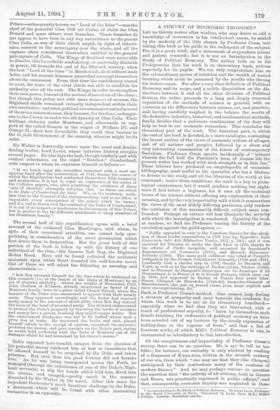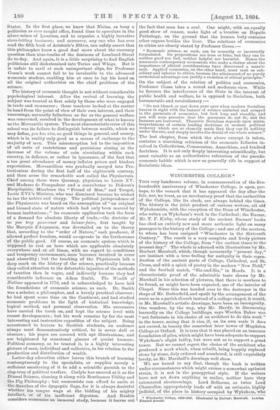A SURVEY OF ECONOMIC THOUGHT.* LET no thirsty seeker after
wisdom, who may desire to add a knowledge of economics to his intellectual assets, be misled by the modesty of the title chosen by Professor Coma into- taking this book as his guide to the rudiments of the subject. For it is a great work, and a monument of stupendous labour and patient research ; but it is not an Introduction to the Study of Political Economy. The author tells us in his Prolegomena that his work is an elementary book, written especially for his pupils. We can only congratulate him on the extraordinary power of intuition and the wealth of varied learning which must be possessed by the youths who throng his lecture-room. For after a very clear definition of Political. Economy and its scope, and a subtle disquisition on the dis- tinctions between it and all the other divisions of Political Science, the writer proceeds to a long and deeply reasoned exposition of the methods of science in general, with an, excursus on the differences between science, art, and practice; and, having carefully weighed in the balance the merits of the deductive, inductive, historical, and mathematical methods, finally decides that a judicious combination of the four will help us best in our economic researches. This concludes the theoretical part of the work. The historical part, to whicl. the rest of the book is devoted, is a mere catalogue, containing the barest outline of the views of economic writers of all ages, and of all nations and peoples, followed by a short and very interesting examination of the tenets of contemporary Socialism. Professor Cossa speaks incidentally of "labours wherein for full half the Psalmist's term of human life the present writer has worked with such strength as in him lies." These labours have produced an encyclopiedia of economic bibliography, most useful to the specialist who has a lifetime to devote to the study, and all the libraries of the world at his. command ; under these conditions the work is a key to pinto logical omniscience, but it would produce nothing but night-. mare if laid before a beginner, for it uses all the technical terms of the science without offering any explanation of their meaning, and by the very impartiality with which it summarisee the views of the most widely differing partisans, only renders- the confusion of this necessarily difficult subject more con- founded. Perhaps an extract will best illustrate the severity with which the investigation is conducted. Opening the book at random, we find the Professor tracing the history of the revolution against the guild-system I- " Dolfin appealed in vain to the Venetian Senate for the aboli- tion of these trades corporations in 1752 (see Ag. Sagredo's Suns Gonsorterie delle Arti Bdificative, Venice, 1857, p. 190) ; and it was reserved for Tuscany to strike the first blow in 1770, thanks to the efforts of Pietro Leopoldo, well seconded by Sarchiani's Ragionamento sal Commercio (1781), and Memorie Economics- Politiche (1783). The same good riddance was voted at TurgoVe instigation by the French Constituent Assembly (1776 and 1791), Lombardy took a similar step in 1787, thanks to Becoaria and Verri, as well as to the writings of Decker (1744), Tucker (1750), and to Plumart de Dangent's Remarques our les Avantages et les Descovantages de la Prance of de la Grande Bretagne, which came out in 1754, and appeared in Italian at Venice four years later. Simon Clicquot de Blervache (1723-96), Inspector-General of Manufactures, also put on record views even more explicit and more uncompromising, &a."
Such is Professor Oossa's method. One cannot help feeling a mixture of sympathy and envy towards the students for whom this work is to act as an elementary handbook— especially when we find that they are instructed, with a touch of professional asperity, to "learn by themselves such details touching the rudiments of political economy as have been crowded out of my lectures by the steady expansion of holiday-time at the expense of term," and that a list of fourteen works, of which Mill's Political Economy is one, is, enumerated as introductory to this introduction.
Of the completeness and impartiality of Professor Cossa's, survey, there can be no question. He is apt to tell us taa. little ; for instance, our curiosity is only whetted by reading of a fragment of Kwa,n-teze, written in the seventh century of our era, from which "one may see that they (the Chinese) anticipated by their institutions many of the customs of modern finance." And we may perhaps venture to question the assertion that "the activity of all citizens, both in Greece, and Rome, was practically engrossed in public affairs," and that, consequently, economic inquiry was neglected in these * An Introduction to the Study of Political Economy. By. Luigi Cocoa, Professor In the Royal University of Pavia. Translated by Lotus Dyer, Sallie.% • College. London : Macmillan and Co. States. In the first place, we know that Nicias, as busy a politician as ever sought office, found time to speculate in the silver-mines of Lanrium, and to organise a highly lucrative slave-letting business ; and moreover, any one who has ever read the fifth book of Aristotle's Ethics, can safely assert that this philosopher knew a good deal more about the currency question than nine-tenths of the denizens of Lombard Street do to-day. And again, it is a little surprising to find English politicians still dichotomised into Tories and Whigs. But it is unfair to cavil at such unimportant slips, for Professor Cossa'a work cannot fail to be invaluable to the advanced exmomic student, enabling him at once to lay his hand on all the original authorities on the chief problems of the science.
The history of economic thought is not without considerable psychological interest. After the revival of learning, the subject was treated at first solely by those who were engaged in trade and commerce ; these teachers looked at the matter in hand from the point of view of their own interest, and their reasonings, naturally fallacious as far as the general welfare was concerned, resulted in the development of what is known as the Mercantile system. The most characteristic error of this school was its failure to distinguish between wealth, which we may define, pro hoc vice, as good things in general, and money, which is in reality only good as a means of exchange to the majority of men. This misconception led to the imposition of all sorts of restrictions and provisions aiming at the increase of the volume of coin circulating within each country, in defiance, or rather in ignorance, of the fact that a too great abundance of money inflates prices and hinders exportation. Mercantilism was gradually merged into Pro- tectionisra during the first half of the eighteenth century, and then arose the remarkable sect called the Physiocrats. Chief among these were Quesnay, physician to Louis XV. and Madame de Pompadour and a contributor to Diderot's Encyclopedie, Mirabeau the "Friend of Men," and Tnrgot, Louis XVI.'s Minister, who was dismissed because he wished to tax the nobles and clergy. The political jurisprudence of the Physiocrats was based on the assumption of "an original and blessed state of nature which had only been marred by human institutions ; " its economic application took the form of a demand for absolute liberty of trade,—the doctrine of ne pas trop gouverner and laisser-faire, first taught by the Marquis d'Argenson, was dovetailed on to the theory that according to the "order of Nature," each producer, if allowed perfect freedom, would co-operate in the furtherance of the public good. Of course, an economic system which is supposed to rest on laws which are applicable absolutely everywhere and at all times, with no regard to conditions and temporary environment, soon becomes involved in error and absurdity ; but the teaching of the Physiocrats left a deep mark on the history of the science, practically because they called attention to the detestable injustice of the methods of taxation then in vogue, and indirectly because they had considerable influence on Adam Smith. The Wealth of Nations appeared in 1776, and is acknowledged to have laid the foundations of economic science, as such. Dr. Smith was a scholar, a philosopher, and a keenly practical observer; he had spent some time on the Continent, and bad studied economic problems in the light of historical knowledge, logical method, and personal observation. His successors have carried the torch on, and kept the science level with recent developments ; but his work remains by far the most interesting and instructive exposition of the subject. Being accustomed to lecture to Scottish students, an audience always most demonstratively critical, he is never dull or obscure ; his pages are covered with apt illustrations, and are brightened by occasional gleams of quaint humour. Political economy, as he treated it, is a highly interesting picture of man, individual and collective, in his relation to the production and distribution of wealth.
Latter-day education either leaves this branch of learning contemptuously to the specialists, or supplies merely a sufficient smattering of it to add a scientific garnish to the clap-trap of political warfare. Carlyle has sneered at it as the Dismal Science, classing it along with Benthamee Utility and the Pig Philosophy ; but economists can afford to smile at the diatribes of the dyspeptic Sage, for it is always doubtful whether his tongue wags at the bidding of his mighty antelleot, or of his inefficient digestion. And Ruskin considers economics an immoral study, because it leaves out the fact that man has a soul. One might, with an equally good show of reason, make light of a treatise on Hepatic Pathology, on the ground that the human body contains other organs besides the liver. The relations of economics to ethics are clearly stated by Professor Cossa :—
"Economic science, as such, can be correctly or incorrectly formulated. Its propositions are true or false, but they can be neither good nor bad, neither helpful nor harmful. Hence the numerous contemporary economists who make a clatter about the importance of ethical considerations have discovered a mare's- nest. Applied economics, on the other hand, must rank as sub- sidiary and inferior to ethics, because the attainment of no purely economical advantage can justify a violation of ethical principles."
On the subject of the relation of politics and economics,
Professor Coss& takes a sound and moderate view. While he favours the interference of the State in the interest of public health and welfare, he is opposed to Socialism, both bureaucratic and revolutionary :—
"Do not blench or cast down your eyes when modern Socialism heaves in sight with the banner of science unfurled and arrayed in the garments of economics, but look long and steadily, and you will soon perceive that the garments do not fit, and the banners axe borrowed. Theoretic Socialism depends upon misin- terpretations of certain leading doctrines in modern politioal economy which are so clumsily made that they can fit nothing under the sun, and simply involve the denial of our whole science."
The last chapter, from which the above excerpt is taken, contains a searching criticism of the economic fallacies in- volved in Collectivism, Communism, Anarchism, and kindred doctrines. It is not only deeply interesting scientifically, but most valuable as an authoritative refutation of the pseudo- economic babble which is now so generally rife in support of Socialistic ideas.



































 Previous page
Previous page